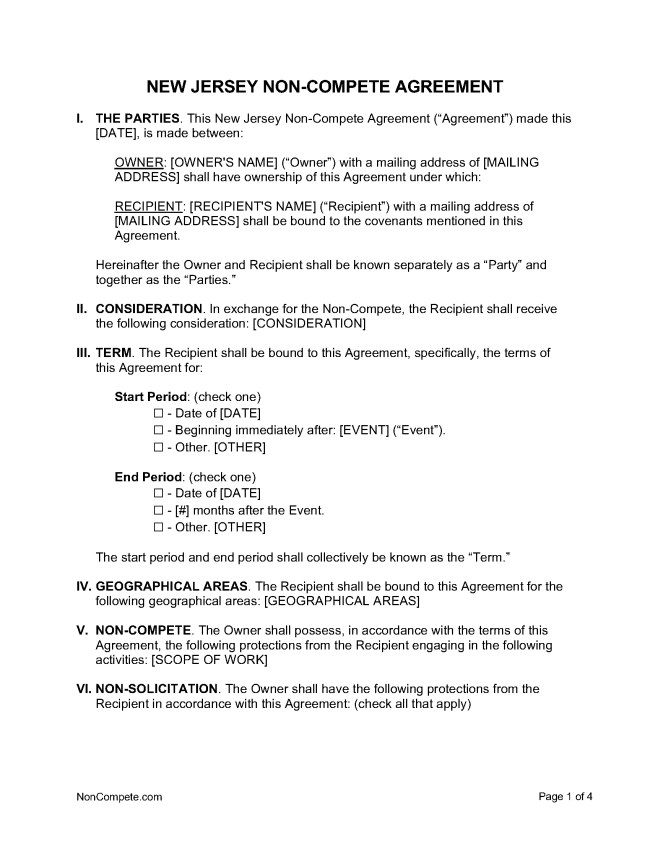A New Jersey non-compete agreement is a set of contractual terms that limits a person from pursuing a particular line of work. As in other states, non-competes in New Jersey are primarily an issue for employment contracts, but they may also be incorporated into contracts for the sale of a business.
New Jersey is one of few states that totally prohibits psychologists and therapists from signing non-compete agreements.
Table of Contents |
Are Non-Competes Enforceable in New Jersey?
Yes, so long as they are reasonable. Non-compete agreements will be considered reasonable if they
- Protect the legitimate interest of the employer;
- Impose no undue hardship on the employee; and
- Are not injurious to the public.
Whitmyer Bros. v. Doyle (1971).
Legitimate Business Interest
Employers may validly protect the following with non-compete agreements:
- Trade secrets
- Confidential business information that does not necessarily meet the definition of trade secret
- Customer relationships
Ingersoll-Rand Co. v. Ciavatta (1988).
Sale of Business vs. Employment Contract
A non-compete agreement that is included as part of the sale of a business is more freely enforceable than one included in an employment contract. (Solari Indus., Inc. v. Malady (1970).
Undue Hardship
Whether a non-compete imposes an undue hardship on an employee depends on the difficulty of finding other work in the field, and the reason the employee is no longer working for the employer. In The Cmty. Hosp. Grp., Inc. v. More (2005), the New Jersey Supreme Court held that a non-compete did not impose an undue hardship because the employee, a neurosurgeon, was in high demand, and because he voluntarily left his position.
Public Interest
In evaluating whether a non-compete agreement would harm the public, courts consider the demand for service in the field impacted by the agreement, and the effect that removing the restrained person would have. (Karlin v. Weinberg (1978))
Prohibited Professions
Lawyers may not sign employment, partnership, or similar agreements that limit the attorney’s ability to practice in the future. Rule 5.6(a), New Jersey Rules of Professional Conduct.
Lawyers cannot join case settlements that restrict their ability to represent clients in the future. Rule 5.6(b), New Jersey Rules of Professional Conduct.
Although physicians are permitted to enter non-compete agreements under limited circumstances (Karlin v. Weinberg (1978)), N.J. Admin. Code § 13:42-10.16 has been interpreted to mean that non-competes are completely prohibited among therapists and psychologists. (Comprehensive Psychology Sys., P.C. v. Prince (2005)).
Terminating an Employee
It is unclear whether a non-compete is enforceable against an employee terminated by the employer. In The Cmty. Hosp. Grp., Inc. v. More (2005), the Supreme Court of New Jersey held that non-compete agreements are not enforceable against terminated employees if enforcing them would create a hardship.
The employer has the burden of proving that a non-compete agreement is enforceable. (ADP, LLC v. Kusins (2019)).
Continued Employment (consideration)
For at-will employees, continued employment is likely sufficient consideration to enforce a non-compete agreement. In Hogan v. Bergen Brunswig Corp. (1977) held that there was adequate consideration in the case of an at-will employee who kept working for a company for three years after signing the agreement.
However, it’s unclear how long the employee must continue to work for the agreement to be enforced, and it may not be enforceable if the employee is terminated not for cause.
Maximum Term
There is no maximum term for non-competes in New Jersey. Courts look at the circumstances of each case in deciding whether an agreement is enforceable.
Agreements for one year (Hogan v. Bergen Brunswig Corp. (1977)) or two years (The Cmty. Hosp. Grp., Inc. v. More (2005)) have been upheld in various instances. Five years for a dermatologist (Karlin v. Weinberg (1978)) appears to be the longest approved, but it is unclear how applicable this is outside the context of the medical profession.
Blue Penciling (allowed)
Courts can modify a non-compete agreement that is overbroad in some way to eliminate the problematic provision and enforce the remainder of the agreement. (Platinum Mgmt., Inc. v. Dahms (1995)).
